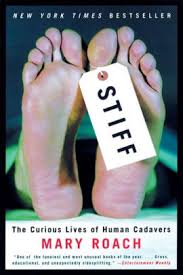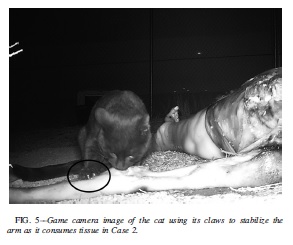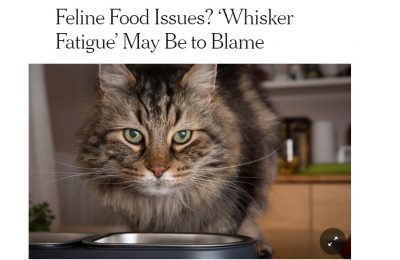Being a cat behaviorist often means interesting conversations with strangers. People always have questions about their cats, but not always the questions I would like to answer, such as “how can I make my cat happy?” or “how many litter boxes does my cat need?” No – people want to know about idiosyncrasies such as, ”Does my cat hate my boyfriend?” or “Does the full moon make my cat crazy?”
For some reason, people are surprisingly concerned about being eaten by their pet after they die. A Google search for “will your pet eat you when you die” has over 400 MILLION hits. Perhaps you should be concerned because science suggests that the answer to that question is a resounding “Yes.”
A recent paper, “The scavenging patterns of feral cats on human remains in an outdoors setting,” published in the Journal of Forensic Sciences, perhaps needs a little context. To my knowledge, the researchers were not directly testing whether cats will eat human remains…but sometimes when you are doing science, the unexpected happens. And sometimes that unexpected is a scientific discovery in and of itself.
 In this case, researchers at the Forensic Investigation Research Station (FIRS) in Colorado were doing what they normally do: studying the decomposition of human bodies. Now this alone is a topic of great fascination (at least if you are me), and I highly recommend reading Mary Roach’s book “Stiff” if you want to know more about what happens to bodies donated to science! It’s a truly fascinating read. ANYWAY, back to FIRS. They have an outdoor “decomposition facility” which is fenced to keep out large predators and is under surveillance to monitor the normal tissue damage caused by weather exposure and other happenings, including scavenging by small animals (typically birds, insects, and mice).
In this case, researchers at the Forensic Investigation Research Station (FIRS) in Colorado were doing what they normally do: studying the decomposition of human bodies. Now this alone is a topic of great fascination (at least if you are me), and I highly recommend reading Mary Roach’s book “Stiff” if you want to know more about what happens to bodies donated to science! It’s a truly fascinating read. ANYWAY, back to FIRS. They have an outdoor “decomposition facility” which is fenced to keep out large predators and is under surveillance to monitor the normal tissue damage caused by weather exposure and other happenings, including scavenging by small animals (typically birds, insects, and mice).
The paper reports that five days after a body was added to the outdoor facility, a “striped cat” breached security and was observed consuming said body, which belonged to a 79-year old woman. I hate to say it, but the demographic fits. The cat was consuming tissue from the left arm and chest. In order to complete the ongoing research project without interference by the tabby, a cage was placed around the body for a week, which put a temporary halt to the snacking. But when the cage was removed, the cat returned and continue scavenging the same body for the next month or so.
When a second, all-black cat showed up on the scene, the scientists allowed him to scavenge to his fuzzy heart’s delight. In this case, he chose a 70-year old man’s body who had been in the outdoor facility for almost a week. This cat also had a taste for the left side of the body, preferring the arm and abdomen. The cat made 12 visits over the course of about six weeks, always visiting the same body.
In both cases, the cats showed a preference for a particular body and particular locations on the body. Both cats had ready access to around 40 other people, and new bodies came and went, but each cat chose to chomp on the same body, repeatedly. The cats also showed a preference to scavenge where the tissue had previously been damaged, although the bodies were described as being in relatively early stages of decomposition.
Now lest you think I’m throwing cats under the bus for a sensationalistic news story, I’d like to bring up a few things. First of all, this finding is interesting not just because I’m fascinated by morbid things, but because cats are naturally hunters, not scavengers. Scavenging is something dogs do, and scavenging behavior is rarely observed in felid species. However, this publication opens up the possibility that scavenging is more common than thought in cats. Or that scavenging might be influenced by other factors, such as hunger.
 Second, before you go and hug your dog now that you’ve realized that your cat could eat you if you die – not so fast!! A Google Scholar search for “postmortem injuries pets” led to a deep dive into the world of forensic sciences where indoor pets do occasionally eat their deceased human. This deep dive revealed that perhaps your dog has evolved to love you, but he won’t think twice about eating your body after you die and he’s trapped with your body – EVEN IF HE’S NOT HUNGRY!! Dogs have been found shortly after a human’s death, with a full bowl of food and a stomach full of human flesh. Side note: there was even a golden hamster who indulged in some postmortem tasting of his respective human.
Second, before you go and hug your dog now that you’ve realized that your cat could eat you if you die – not so fast!! A Google Scholar search for “postmortem injuries pets” led to a deep dive into the world of forensic sciences where indoor pets do occasionally eat their deceased human. This deep dive revealed that perhaps your dog has evolved to love you, but he won’t think twice about eating your body after you die and he’s trapped with your body – EVEN IF HE’S NOT HUNGRY!! Dogs have been found shortly after a human’s death, with a full bowl of food and a stomach full of human flesh. Side note: there was even a golden hamster who indulged in some postmortem tasting of his respective human.
The 1994 publication in the American Journal of Forensic Medicine and Pathology, “Postmortem Injuries by Indoor Pets” identified a few key risks to being eaten by your pet after you die:
- having free-moving pets in the home
- being socially isolated (meaning discovery of your body is delayed), and
- having an illness that might lead to sudden death.
Because some of these scavenging incidents happen shortly after the human dies, other researchers have theorized that it’s not necessarily hunger that triggers the injuries that occur, but an attempt by the pet to get the attention of or even revive their human. That said, a lot of injuries inflicted by pets after their human’s death do appear to be hunger motivated, and many of the pets who did eat their humans also died of starvation themselves (or in one case, from being poisoned from the drugs that their owner had overdosed on).
If push came to shove, would your cat eat you? Yes. But so would your dog. Our pets have no moral code that prevents them from eating flesh, from biting the hand that fed them. They have no need to uphold a standard that — to many of us — reflects a deep and loving relationship and a line that should not be crossed. The irony is that many of us have difficulty discerning why we eat some animals and love others. But to our pets, if we are dead, it may be that in that moment we are just meat.
Thank you to Julie Hecht for her helpful feedback on this post!
References:
Garcia, S., Smith, A., Baigent, C., & Connor, M. (2019). The Scavenging Patterns of Feral Cats on Human Remains in an Outdoor Setting. Journal of Forensic Sciences.
Herzog, H. (2010). Some we love, some we hate, some we eat. Harper Books.
Roach, M. (2003). Stiff: The Curious Lives of Human Cadavers. W.W. Norton & Company.
Rossi, M. L., Shahrom, A. W., Chapman, R. C., & Vanezis, P. (1994). Postmortem injuries by indoor pets. The American Journal of Forensic Medicine and Pathology, 15(2), 105-109.
Suntirukpong, A., Mann, R. W., & DeFreytas, J. R. (2017). Postmortem Scavenging of Human Remains by Domestic Cats. Siriraj Medical Journal, 69(6), 384-387.




What if someone just faints and falls into a coma, as sometimes happens? Will your pet munch down on your living body?
no idea!!